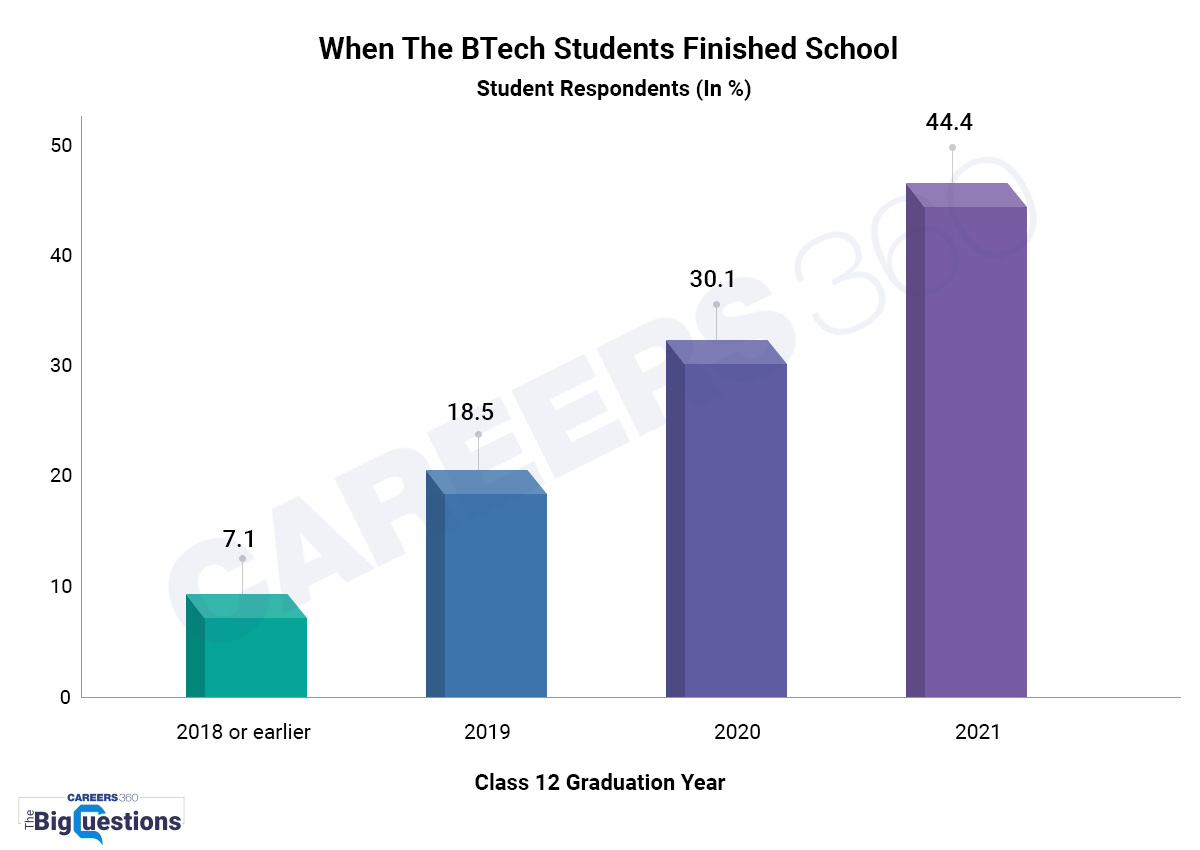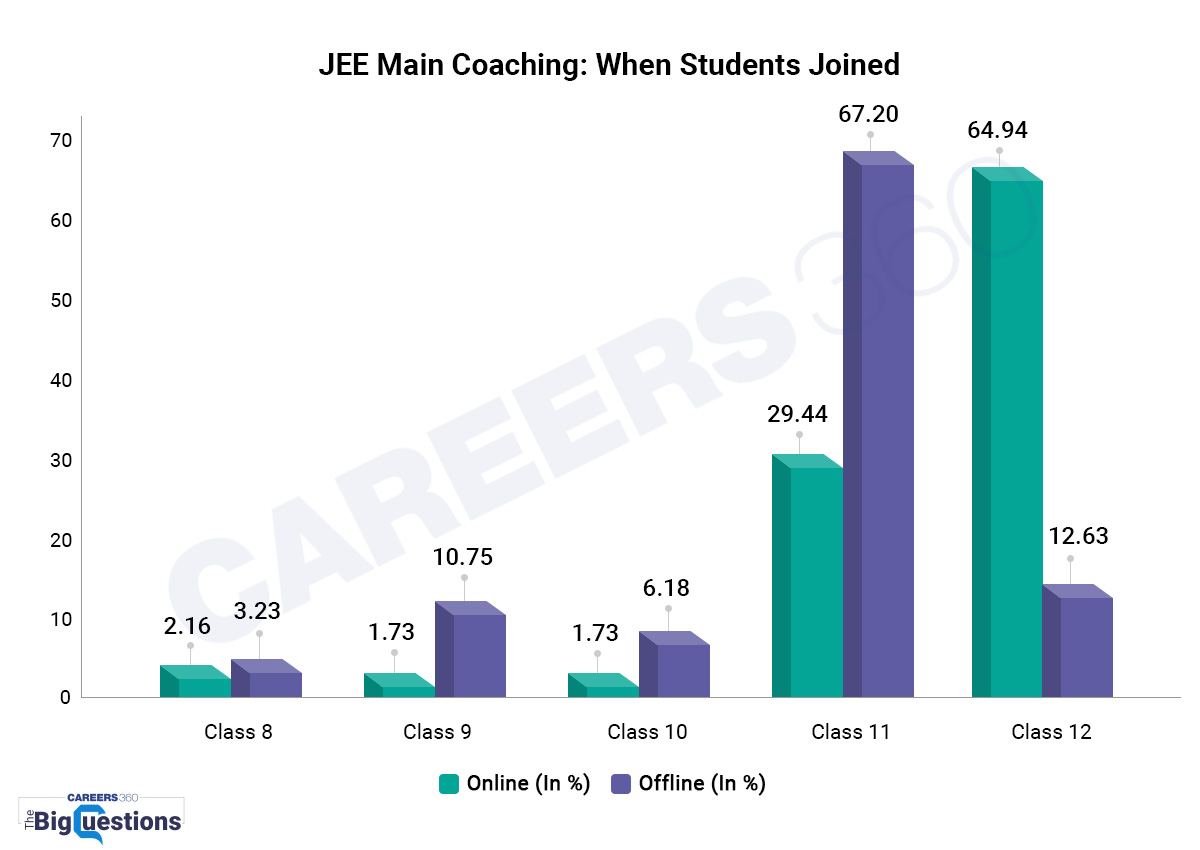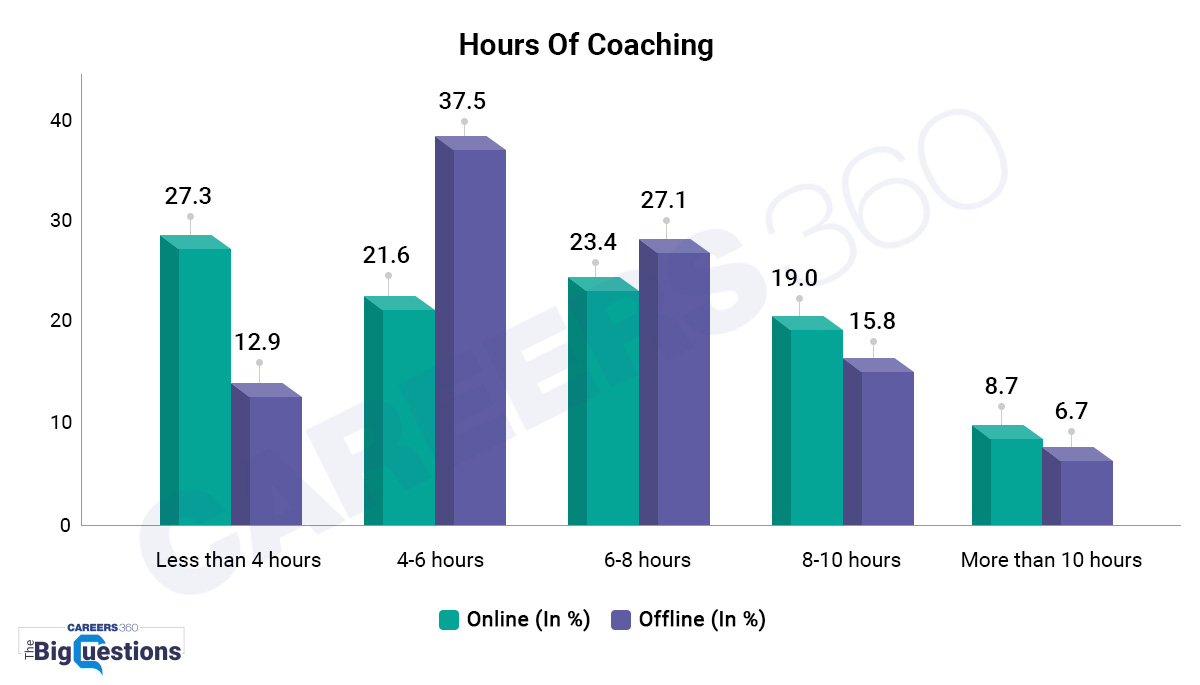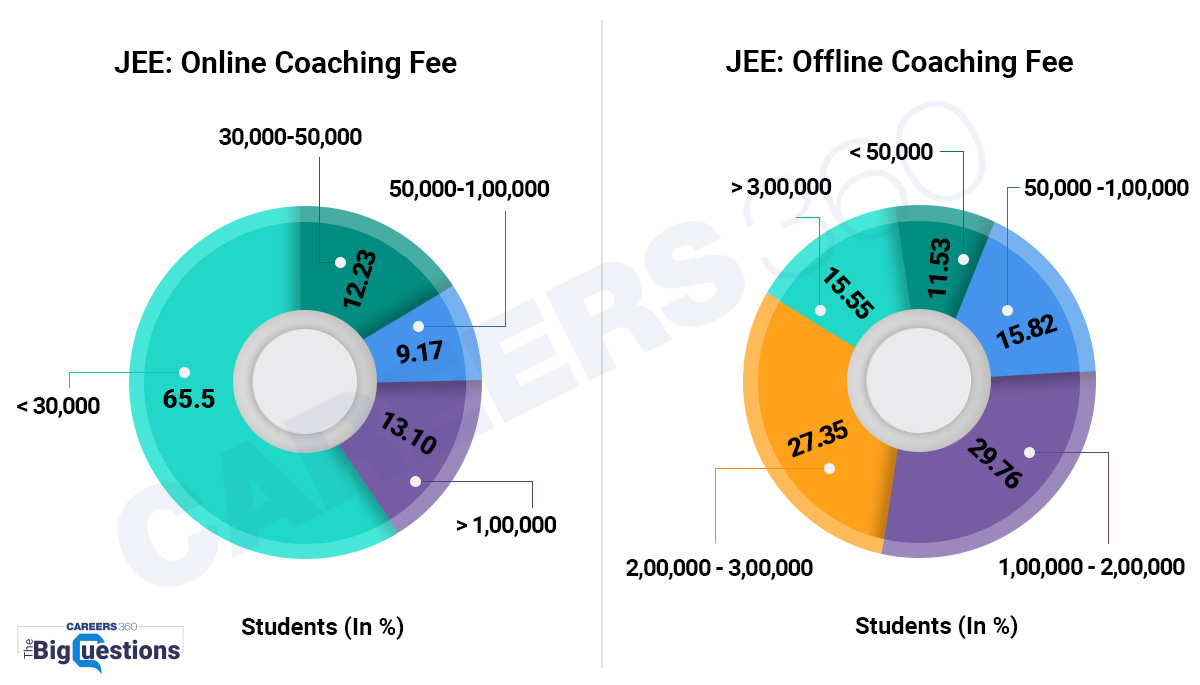Amity University-Noida B.Tech Admissions 2026
Among top 100 Universities Globally in the Times Higher Education (THE) Interdisciplinary Science Rankings 2026
The vast majority of engineering aspirants – 79.8 percent – who actually make it to the premier technical institutions including Indian Institutes of Technology (IIT), National Institutes of Technology (NIT) and Indian Institutes of Information Technology (IIIT), start coaching for the Joint Entrance Examination (JEE Main and JEE Advanced) in or after Class 11.
The JEE Main 2026 registration process for session 2 was closed on February 25, 2026, and fee payments will be accepted until 9:00 pm on the same day.

As many as 94.4 percent of students who joined coaching online did so in Class 11 or later; in the case of offline coaching, 79.8 percent started at that level. Among IITians, 76.8 percent started coaching in Class 11 or later; among NITians, this section is even larger – 85.5 percent.
Every year, lakhs of students enrol in private coaching institutes to prepare for the national-level engineering entrance exam, Joint Entrance Examination (JEE) Main and JEE Advanced. In many cases, students move from their homes to coaching hubs such as Kota, Rajasthan. This edition of The Big Questions survey on students’ lives and education was conducted among 1,514 engineering students in some of the top engineering colleges to understand the role private coaching played in their academic careers – when they joined one, how useful they found the Classes and more.
The responses showed that less than 1% of students joined coaching in Class 8 and that the number of students starting in Class 12 was more than double that of students studying in Class 11. Starting coaching in middle school is either less common than previously thought or has such little impact, few students who joined early made it to engineering colleges.
Among top 100 Universities Globally in the Times Higher Education (THE) Interdisciplinary Science Rankings 2026
Last Date to Apply: 28th Feb | Ranked #43 among Engineering colleges in India by NIRF | Highest Package 1.3 CR , 100% Placements
The survey was conducted by Careers360 online from February 8 to March 14, 2022 among 1,514 BTech students enrolled in engineering colleges and also a very small number taking a gap year. About 378 completed the full survey; 1,155 abandoned it mid-way after answering a few questions. All had written the JEE Main but may not have cracked it.
Of the total respondents, about 44 percent had cracked the JEE Main and JEE Advanced and taken admission in one of the IITs; 24.7 percent had cracked just the JEE Main and were in NITs; 9.3 percent students were in IIITs; and 22.4 percent students in other leading engineering colleges.
Respondents’ Institutes | Number | Percentage |
IIT | 660 | 43.6 |
NIT | 374 | 24.7 |
IIIT | 141 | 9.3 |
Other Colleges | 339 | 22.4 |
Total Responses | 1,514 | 100 |
The survey was conducted in 2022 but students who responded graduated Class 12 in 2021 to 2018 or earlier. The table below shows the distribution of respondents by the year of Class 12 graduation.
 When The BTech Students Finished School
When The BTech Students Finished School
The questionnaire asked students for their college name, admission year, Class 12 graduation year, school board and the method of preparing for JEE – online, offline, both, or self-study. Depending on the response, there were further questions on coaching methods, duration of classes, time of joining, fee, hours of study in a day, study material quality, teaching quality, test frequency and more.
For each question, respondents had to pick from a set of multiple answer choices. They were allowed to skip and where “Other” was one of the multiple choices, they were invited to explain.
Also Read | Top Engineering Colleges In Maharashtra Placed 80% Graduates: Latest Data
Out of 1,514 students, only 376 responded to the question about when they first started preparing for JEE. Of the total, 372 responded to queries on offline coaching and 231 to online coaching with significant overlap between the two, implying these respondents had utilised both.
Most students started JEE coaching in Class 11, with about 250 joining offline coaching and just 68 students, online coaching. Students who started preparing in Class 12 preferred online – 150 joined online and about 47 offline. The table below shows the distribution of students by the level at which they started online or offline coaching, calculated out of the total number to respond to each set of questions.
 JEE Main Coaching: When Students Joined
JEE Main Coaching: When Students Joined
Out of the 660 students who got admission in IITs, about 74 percent skipped the question on when they started preparing. Among those who responded, 121 IITians started preparing in offline mode in Class 11, while 65 students started online coaching in Class 12.
When IIT Students Joined JEE Coaching
Class | Online (In %) | Offline (In %) |
Class 8 | 1.0 | 4.2 |
Class 9 | 2.1 | 11.4 |
Class 10 | 1.0 | 6.6 |
Class 11 | 28.1 | 72.5 |
Class 12 | 67.7 | 5.4 |
Of the 374 students enrolled in NITs, 81 responded to the question on when they started preparing through offline coaching and just 58 students responded for online coaching. As many as 82 percent of NITians did not respond to the query on when they started coaching for JEE. For those who did, the distribution of respondents by the level at which they joined coaching is given below.
When NIT Students Joined JEE Coaching
Class | Online (In %) | Offline (In %) |
Class 8 | 3.4 | 2.5 |
Class 9 | 1.7 | 8.6 |
Class 10 | 0.0 | 2.5 |
Class 11 | 27.6 | 70.4 |
Class 12 | 67.2 | 16.0 |
More than 70 percent of the respondents were preparing for JEE when COVID-19 hit India, and online coaching has been incorporated in every student's life since then. But a sizable section of students – 18.59 percent – chose to study on their own.
The main reason for students to join online coaching, other than the COVID-19 pandemic, was the unavailability of offline coaching close to them. A few students chose online coaching because it was more affordable, while some students wanted to focus on board exams. Students opted for online coaching as it provided “better understanding with visualisation”, and as another said, they got “better teacher and teaching experience, topic covered and time flexibility”.
A total of 1,341 student states which form of coaching they used. The table below shows the distribution.
JEE Preparation Mode
Mode | Students (In %) |
Online Coaching | 12.77 |
Offline Coaching | 40.51 |
Both | 28.12 |
Self Study | 18.59 |
There is a significant difference between the number of hours spent on online coaching and offline coaching with the largest segment in online coaching spending less than four hours on the course and the corresponding segment in offline coaching – 140 students or 37.5 percent – spending four to six hours.
 Hours Of Coaching
Hours Of Coaching
The offline coaching fee ranged from less than Rs 50,000 to more than Rs 3 lakh for the full course; online courses were cheaper, costing from less than Rs 30,000 to about Rs 1 lakh. However, the majority spent less than Rs 30,000. Given below is the distribution of candidates by how much they paid.
 JEE: Online, Offline Coaching Fee In Rupees
JEE: Online, Offline Coaching Fee In Rupees
On Question asked by student community
decent chances actually as home state quota seats are 50%. allotments will depend on the JEE rank and not percentile though. in 2025, for female supernumerary it closed at 9286 rank while for open gen it closed at 5573.
So, would advise to use this tool to check the probable
yes you will. Ususally the return is within 7 days i it has failed at the gateway level which it seems to be. Please wait. You will get the money back
Slim chances as in 2025 the closing rank was 118 for SPA Delhi for B.Arch. You will need to wait for the rank list to come in April before getting a better picture. Please check https://engineering.careers360.com/jee-main-college-predictor for the predictions.
Check out https://engineering.careers360.com/jee-main-rank-predictor to know the probable rank
Hey Abhinav!
You can start your JEE Preparation with ICSE. You can check How to Prepare for JEE Main 2026?- Study Plan and start you preparation.
An 87.12% in JEE is good. To get admission to VIT, you'll need to take the VITEEE. You can apply for VITEEE if you meet the eligibility criteria for class 12. Your JEE score is not required for this process. Admission to VIT will be based on your VITEEE score.
Among top 100 Universities Globally in the Times Higher Education (THE) Interdisciplinary Science Rankings 2026
Recognized as Institute of Eminence by Govt. of India | NAAC ‘A++’ Grade | Upto 75% Scholarships
70th University Ranked by NIRF | 80th Engineering Rank by NIRF | Accredited by NBA and NAAC A+
Last Date to Apply: 28th Feb | Ranked #43 among Engineering colleges in India by NIRF | Highest Package 1.3 CR , 100% Placements
Highest CTC 44.14 LPA | UGC Approved | 1600+ Recruiters | 100% Placement
NAAC A++ Grade | Recognized as Category-1 Deemed to be University by UGC | 41,000 + Alumni Imprints Globally